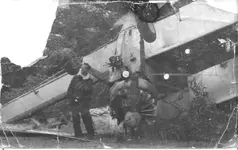LM
Hero Member
- #1
Thread Owner
These are the PADI dive specialty certifications I'll have available to me at my training center once I complete basic OW.
Eventually I'll just get them all, but for the time being, which are most useful on a treasure salvage vessel?
The no-brainers seem to be Boat Diver, Wreck Diver and Search and Recovery... I think five specialties are included in the Adventure classification, so any additional suggestions appreciated. I'm thinking Deep Diver and Equipment Specialist would come in handy, but would like to hear ideas.
Boat Diver
Deep Diver
DPV
Drift Diver
Dry Suit
Enriched Air
Equipment Specialist
Ice Diver
Multilevel diver
Full Face Mask
Night Diver
Peak Performance Diver
Search & Recovery Diver
Underwater Naturalist
Wreck Diver
Eventually I'll just get them all, but for the time being, which are most useful on a treasure salvage vessel?
The no-brainers seem to be Boat Diver, Wreck Diver and Search and Recovery... I think five specialties are included in the Adventure classification, so any additional suggestions appreciated. I'm thinking Deep Diver and Equipment Specialist would come in handy, but would like to hear ideas.







 PADI, NAUI, SSI and the technical certifying agencies are the most regulated standards for diving instruction developed through years and years experience. Diving is a very safe sport. The problem is that when accidents happen, they are quite severe. Not all Course Directors/Instructors are the same, but they all have to abide by standards or risk decertification/suspension/expulsion. Yes, many shops will sell equipment that you don't need and I'm as guilty of it as the next instructor. When you work on commission in a shop and customer is determined on such and such, whiz bang, latest flavor, equipment add-on then the end result is an equipment sale that the customer doesn't "need".
PADI, NAUI, SSI and the technical certifying agencies are the most regulated standards for diving instruction developed through years and years experience. Diving is a very safe sport. The problem is that when accidents happen, they are quite severe. Not all Course Directors/Instructors are the same, but they all have to abide by standards or risk decertification/suspension/expulsion. Yes, many shops will sell equipment that you don't need and I'm as guilty of it as the next instructor. When you work on commission in a shop and customer is determined on such and such, whiz bang, latest flavor, equipment add-on then the end result is an equipment sale that the customer doesn't "need". 